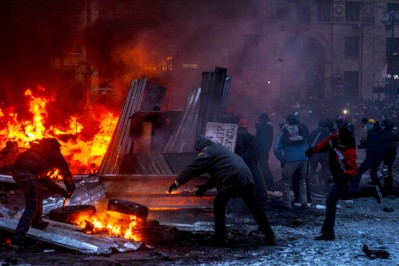UKRAINE. Beginning in November 2013, the Ukrainian political crisis began from the diverging paths of signing an association agreement with the EU or joining Russia in the Eurasian Customs Unions. The Ukrainian government sided with Russia, who offered a $15 billion loan package and discounted gas rates. Following this decision, the government ordered a violent dispersal of peaceful protests and very quickly Euromaidan became less about economic agreements and more about holding an undemocratic, corrupt system accountable for their actions.
The recent geopolitical crisis in Crimea has led to the largest international response since September 11th, 2001. Despite the entire world’s condemnation of Russia’s aggressive infringement on Ukrainian sovereignty, the issue remains unsolved and solutions seem stagnant. Since the initial entry into Crimea, Russian troops have only multiplied – by now, effectively securing the entire peninsula and mining off entry points from Ukraine’s mainland. Under such conditions, Crimea’s newly formed Pro-Russian, separatist government expects to hold a free and fair referendum to decide Crimea’s future. Understanding the reality that the result on March 16th will be Crimea’s annexation, war between the two former Soviet states is a real possibility. A week from now, there will be yet another crucial decision making process that will not only affect the future of Ukraine – but the entire world.
Sanctions against Russia, as President Putin stated “will have consequences for everyone” and it seems unlikely that Russia will simply return Crimea following economic sanctions. Unfortunately, the European Union’s options are narrowly limited precisely to sanctions – besides France, there are very few hard power contributions from other members. If the Ukrainian military takes actions following the Crimean referendum, it will need the support of the United States to drive the Russians out of Crimea and ensure no further intrusions on Ukrainian land. For the United States, which has spent over $5 billion on “democratization” in Ukraine since 1990, this may be the deciding conflict in ending Russian aggression. Following Georgia in 2008 and now Ukraine, further appeasement would only encourage President Putin to extend his reach into other sovereign territories.
Throughout the months of December, January, and February – international pressure was exerted on the ruling government to stay within the parameters of diplomacy and peace. In a situation which involved a sovereign nation resolving an internal conflict, it was important to refrain from any direct foreign intervention. But the Crimean issue has not only breached existing international law, but poses a serious threat as precedent in the event that the Russian Federation goes unpunished. Anything short of military action will not be enough to send a message to President Putin. In the event that Ukraine resorts to unilateral military actions against Russia, the international community will witness yet another missed opportunity to prevent future bloodshed. For now the conflict is limited to the Crimean peninsula, let’s ensure it does not escalate into the Ukrainian mainland.

